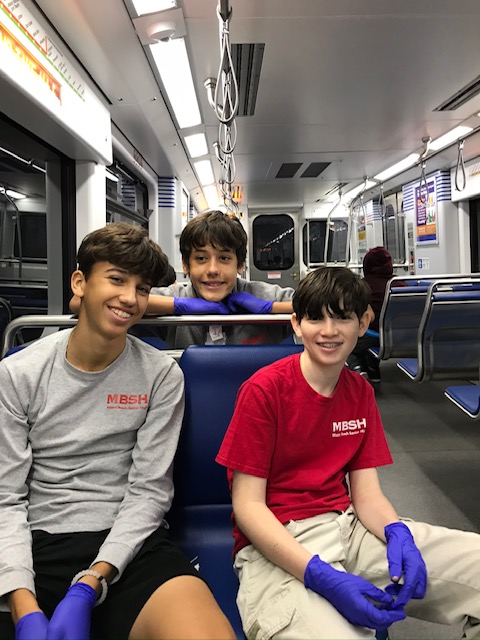STEM-In-Action Fall Follow-Up: Fight the Fomites
Fridays are our favorite day of the week for many reasons, but most importantly our Fall Follow-Ups! Its on Fridays that we can get to catch up with all our STEM-In-Action grant recipient teams to see how they have been using their grant money to further their projects they brought to our National Judging & Educational Event (NJ&EE) back in June. If you haven't caught any of our Fall Follow-Ups so far or are new to the STEM-In-Action grant, the U.S. Army Educational Outreach Program (AEOP) STEM-In-Action Grant awards eCYBERMISSION teams up to $5,000 to develop their projects into mature and scalable solutions in their community. Normally, we award this honorary grant to five teams, but this year ten teams took home the prestigious award. This week, we're heading down to Miami to catch up with 9th grade team, Fight the Fomites, to see how they are making their Miami Metrorail better for commuters within their South Florida community.
Hello everyone, we are team Fight the Fomites. Our team consists of three members, Noah Cohen, Harrison Delisle, and Leo Oliveira. We are from Miami Beach Senior High School and are now in 10th grade. We were first introduced to eCYBERMISSION through our middle school’s 6th grade science fair where we became interested in microbiology and tested for bacteria on commonly touched items such as: credit card scanners, phones, television remotes, and grocery store checkout screens. Since then, we have continuously been doing eCYBERMISSION projects every single year.
For our recent eCYBERMISSION project, we evaluated the bacterial load present on the Miami Metrorail System. We wanted to evaluate the Miami Metrorail as it is a very common and important part of our public transportation here in South Florida. We tested commonly touched surfaces at the stations and train cars. We wanted to see what types of bacteria were growing and what risks our community was exposed to.
What we found was shocking! We found high levels of virulent bacteria on nearly all tested touch surfaces. We tested the ticket dispensers, the elevator buttons, handrails, seat, etc. Surprisingly, much of the bacteria that we found were enteric, meaning they come from intestinal sources and feces. This means that the surfaces were contaminated because people were not washing their hands.
Specifically, we found Methicillin-resistant Staph Aureus (MRSA) and Enterobacter faecalis, among other dangerous bacteria. We found that the best way to protect yourself from these dangerous bacteria is wash your hands frequently, before and after riding the trains, and maintain healthy hand hygiene. We were fortunate enough to receive the Stem-In-Action grant and be given the opportunity to further our research and experiment. We plan to re-evaluate the Miami Metrorail using the same methods as we did in our eCYBERMISSION project, this time, however, it will be post COVID pandemic. We hope that with all the bombardment of information about hygiene that our findings will show less contamination on the Metrorail. In addition, this time, we will also be testing for viruses such as COVID-19 using PCR and DNA testing.
The second part of our Stem-In-Action project is to spread awareness on the dangers that are present on many commonly touched surfaces on the Metrorail, and how to protect yourself from these dangers. We will be placing advertisements on the Miami Metrorail to alert passengers to the dangers that are present on many commonly touched surfaces. Finally, we will be providing hand sanitizer bottles to our school and peers and will be giving presentations to the students to raise awareness on this issue.
AEOP Communications & Marketing Specialist
cminan@nsta.org







Comments
Post a Comment
We welcome your comments and expect that our conversation will follow the general rules of respectful civil discourse. This is a moderated blog, and we will only post comments from bloggers over 13 years of age that relate to eCYBERMISSION. We will review comments for posting within one business day. Bloggers are fully responsible for everything that they submit in their comments, and all posted comments are in the public domain. We do not discriminate against any views, but we reserve the right not to post comments.